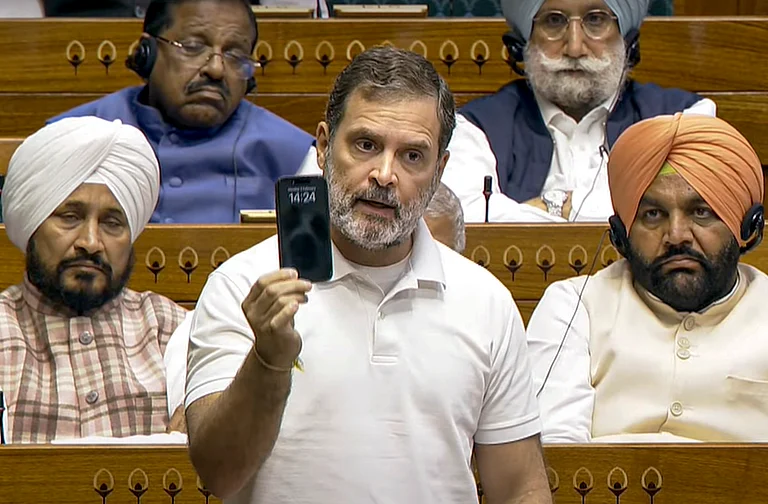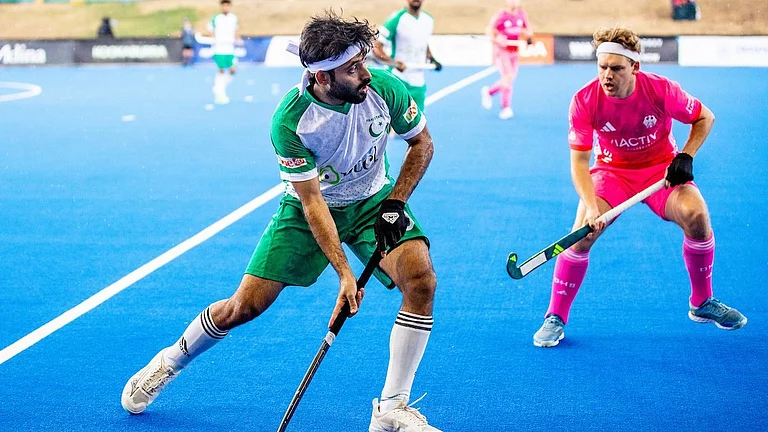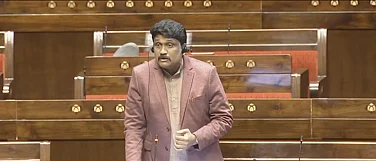Sitting in his modest living room—tastefully furnished in hues of gentle blues—Arvind Kejriwal looks calm as he gets ready to face the voters of Delhi again. Dressed in his trademark V-neck navy blue pullover, he retains the distinct ‘aam aadmi’ aura even after five eventful years as chief minister. In an exclusive interview to Bhavna Vij-Aurora and Preetha Nair, the Delhi CM says he is happy that he managed to change the political discourse in the national capital. Excerpts:
Your term as the CM is coming to an end. Do you think you have managed to deliver on your promises?
We came into politics to work for the people and change the political discourse. Three things have happened in these five years. One, we have proved that governments can be run with honesty. Two, elections can also be fought honestly. Lastly, we have shown change is possible. We have accomplished things that were not done in 70 years. No government before us tried to improve the condition of schools or hospitals. No government made electricity cheaper and ensured its 24-hour supply. Either they didn’t know how to do it or they did not intend to. It suited them to keep the country backward, poor and uneducated. We have also managed to change the political discourse to a large extent. In Haryana, the BJP fights elections on the Jat/non-Jat plank. In Maharashtra, it’s the Maratha/non-Maratha plank, and in Gujarat, Patel vs non-Patel. Elsewhere, it’s Hindu vs Muslim. In Delhi, though, the same BJP is forced to talk about bijli-paani, unauthorised colonies, schools and hospitals. The electoral discourse has shifted to performance. People are talking about the work done by our government. So the BJP has no option. This is a big change in a country where politics is still largely based on caste and religion. For the first time, development is the issue.
Do you think the voters will see it that way and reward the good work?
People are enthused by our work. Even staunch BJP and Congress supporters are saying, “Dilli mein to AAP ko hi vote denge. ” People have this fear that if AAP doesn’t come back, their electricity bills will go up, government schools will again fall apart, and hospitals will revert to their old ways. People have developed a stake in our government. We have fulfilled all our promises. Only the last one remains: free WiFi. Even that is done and will be announced soon.

There are no doctors in some of the mohalla clinics....
There’s a time-lag of about 15-20 days for a clinic to start functioning after it’s built. The opposition takes pictures of those and starts doing propaganda, saying ‘no doctors, no medicines’. I personally monitor the functioning of clinics. I am on the WhatsApp group of all mohalla clinic doctors (shows a group called the ‘Aam Aadmi Mohalla Clinic’ on his phone). Do you think any other CM in the country does this?
Do you think only ‘freebies’ like cheap electricity and free water get votes?
What’s better economics? In one model, you subsidise big corporates. In the other, a common man’s life is subsidised. Many shifted from private schools to government ones after they saw the change. We have improved hospitals: all medicines and tests are free. Electricity is cheapest in Delhi. Water is free. Bus rides have been made free for women. On an average, even if a family saves Rs 5,000 a month due to all this, that’s Rs 60,000 per year. If there are 50 lakh families, then we have put Rs 30,000 crore in people’s pockets. So we create demand in the economy. Today, the biggest problem in our economy is that goods are not being sold. What can be better economics than creating demand?
Is this model sustainable? Sceptics say it will lead to financial bankruptcy. Where did the money come from?
It is sustainable, and our revenue is only growing. To begin with, we reposed trust in people, traders and businessmen. I have worked in the I-T department. We were taught that large-scale tax evasion happens when people feel the tax on their hard-earned money is being stolen by politicians and officers. Corruption leads to tax evasion. When people see their tax money being utilised properly, there’s greater compliance. Lower tax rates also increase compliance. We did both within two years. We had VAT then. All items in the 12 per cent category were reduced to 5 per cent.
We also stopped the raid raj completely, inspiring compliance rather than fear. From 2010 to 2014, under Sheila Dikshit, tax collection increased from Rs 26,000 crore to Rs 31,000 crore. After I lowered tax slabs, it increased to Rs 60,000 crore! We increased revenue by almost Rs 6,000 crore per annum, because compliance increased. We also reduced corruption to a large extent. High-end corruption, where big contracts are involved, is gone. A flyover estimated to cost Rs 325 crore was completed with Rs 250 crore. Earlier, a Rs 300-crore flyover would ultimately cost Rs 1,500 crore after cost and time overruns. We are saving in terms of both cost and time.
You have a lot of support among the poorer sections....
Not just the poor, but also among the middle class and upper middle class. When we improved government schools, we got maximum praise from the upper middle class. They said, “Kejriwal ji, yeh asli development hai. ” You are actually creating a foundation for a strong nation.
The Centre has just passed the Bill to legalise unauthorised colonies. Will that benefit the BJP in Delhi?
People are unable to trust the BJP. Several such laws have come earlier too. But people want a registry in their hands. The Centre says registrations will be done after six months—after the elections. Sheila Dikshit also used to say, “We will do it after the elections. Give us the votes now.” Then, when people went to her, she would say, come at the time of next elections. Now, the BJP is saying 100 people will be given registries to begin with. It is only to call them on stage for a photo-op.
Women are happy about free bus and metro rides. What about women’s safety?
We have put street lights and CCTV cameras. Bus marshals have been deployed. Whatever was in our hands, we have done. But policing, which needs attention, is not in our hands. Women’s safety shouldn’t be politicised; state and Centre should work together on this.
What are you offering Delhi for the next five years?
It’s time to take Delhi to the next level. What we have done till now is the basics—schools, hospitals, roads.... Now we have to turn Delhi into a modern, tech-savvy smart city. Transport needs to improve. The Yamuna has to be cleaned. Like we have ensured 24-hour power, next we have to do it for water. People have stopped buying generators and inverters. Now we’ll ensure they don’t need to use water pumps. Pollution has to be reduced.
Pollution…how?
Only the two months of stubble-burning are not in our control. Otherwise, we have reduced pollution by 25 per cent for 10 months in the year. The biggest impact came with the steep fall in the use of generators. (There used to be an estimated six-seven lakh generators in Delhi. They are all gone now.) Then the east-west peripheral roads have come up. Thousands of trucks that used to enter Delhi now take these highways. We increased Delhi’s forest cover by 0.8 per cent. All industries that used polluting fuels have been converted to PNG fuel with strict enforcement. We shut down the two thermal power plants. Whether odd-even was successful—there’s no way of measuring it. Everyone is doing guesswork…there’s politics even on pollution. So, we have tied up with Washington University and set up a lab to get almost real-time data—with a four-hour lag—to allow source apportionment of pollution. It will start functioning from April 1. I can then take decisions based on the causes of pollution at any given time.
Others say AAP spends too much money on publicity, which could have been spent on public works.
Prakash Javadekar said we spent Rs 1,500 crore. Incorrect. We have spent Rs 40 crore. You can compare it with any other state. It’s the lowest. Of this, about Rs 15-20 crore was spent on the dengue campaign. Not a single dengue death happened this year. Cases have come down from 15,000 to 1,300 this year! We have not wasted any money. Then we spent on the odd-even campaign, which was needed.
Does Delhi being a Union territory cause problems in governance? How have you gone around them?
Even after winning 67 of 70 assembly seats, if the elected government does not have the power to take decisions, then it’s an assault on the Constitution and democracy. Till last year, every file of ours used to go to the L-G. For every decision, it used to be a nightmare…whether L-G saab will approve or not. Obviously, there was a lot of politics involved. To get the CCTV cameras file passed, I had to sit on a dharna for 10 days at the L-G’s office. Fortunately, last year, the Supreme Court empowered our government to take decisions on several things. That’s why a lot of work was expedited in the past one year. However, I still don’t have the power to transfer my officers. I may be improving schools and hospitals, but my education and health secretaries are still decided by the L-G. By my opponent party. And I have to beg and plead to get my work done. Even disciplinary proceedings are with the L-G. I cannot take action, I cannot transfer. The latter case is still pending in the apex court.
Delhi has a unique position as the capital city, and it should have smoother governance. It cannot work with a multiplicity of agencies. There should be one elected government with all the powers to take decisions.
The Centre uses the same argument: that it’s the national capital, and hence….
Let the Centre keep the NDMC area…the entire New Delhi council that includes embassies, Parliament, ministers’ bungalows, North Block etc. Give full statehood to the MCD area. This suggestion has been there with the Centre for 15 years. In fact, the full statehood Bill had also come up during (L.K.) Advaniji’s time, but it could not be passed.
Will that be a poll plank?
We will keep trying for full statehood. Both Congress and BJP have gone back on their earlier stand.
Your MLAs had to face several cases….
They tried their best to scare us, threaten us, control us. This is the BJP’s political strategy: open files against opponents, harass and blackmail them…. They raided my office, my house. Police entered my bedroom and searched it. They searched everything and everywhere. They didn’t find anything. They cannot imagine anybody could work with complete honesty. There were false cases against 20 of my MLAs; one after the other, they are falling in the courts and strictures are being passed against investigating agencies. There are 33 cases against me. I’m the biggest criminal in AAP (smiling).
AAP has transformed from a party of agitations to a party of governance. How did the change of mindset happen?
When it was a party of agitations, people developed trust in us, realising we will fight for them. Then people gave us the responsibility to govern, and it’s our duty to fulfil that responsibility properly.
After Maharashtra, there is an impression that the BJP is not invincible anymore. Will that affect Delhi?
Last time also, the BJP was winning election after election, but it came to a halt in Delhi. They were restricted to three seats! This time too, the mood is in favour of AAP. We should get a comfortable majority.
In these Lok Sabha elections, AAP’s voteshare fell to 18 per cent from 33 per cent in 2014….
We were only contesting in Delhi. We could not give a solid reason to people to vote for us in these seven Lok Sabha seats. They saw it as a BJP vs Congress election. They said, “We will vote for you in the Delhi elections. You are nowhere on the national scene as of now.” The assembly elections are different. This trend is now visible in the entire country. In Odisha, voting for assembly and Lok Sabha happened the same day, yet people voted differently. Delhi voters will vote only on the basis of our work. It will be a positive vote, a pro-incumbency vote.
Any plans of aligning with the Congress?
The question doesn’t arise. We will get a good majority on our own.
AAP completed seven years recently. Why has it not grown beyond Delhi?
Don’t you think it’s a big enough achievement for a new small party that it rules the national capital and is the principal opposition in Punjab? Delhi’s people gave us the mandate, and it’s our duty to do justice to it. Other states are looking at governance in Delhi and talking about it. The opportunity will come in other states too.
Why didn’t you contest in Haryana despite it being your home state?
The party decided that we should focus on Delhi for the time being.
In hindsight, do you think your party could have handled Punjab differently?
We had hoped to do much better, probably even form the government. We were not successful, but there are no regrets. As a new party, getting 20 seats in Punjab was a major success.
Many of AAP’s co-founders and your fellow travellers have left the party. Given a chance, would you want them back?
In every party, new people join and some people leave. I believe people should not leave, but sometimes the circumstances are such that they do. It is not appropriate to discuss specific cases. I don’t think any disproportionately large numbers have left our party compared to other parties. The important thing is that we have managed to fulfil the dream we came with, the promise we made of corruption-free and good governance.

Many of those who left the party accused you of working like an autocrat….
People say I am ziddi (stubborn). If you are not ziddi, work doesn’t get done. A corruption-free India is my zidd. Now good education is our zidd. Good healthcare is our zidd. To make Delhi a modern, corruption-free, smart city is our zidd.
You seem to have decided to not engage in direct criticism of PM Modi. Is it a strategic choice?
Why would I criticise the PM? My purpose is to provide good governance to Delhi. If there’s anything we need for Delhi, we will request him. He is our PM. We will ask our L-G. He is also ours. If they don’t accede to our request, we will write letters to them. Whatever we do, we do it for the people. For example, if there’s a shortage of onions and I write a letter to the Centre, it’s not criticism. The people of Delhi need onions. The CCTV cameras file was pending with the L-G for two years. Then Manish Sisodia and I went to the L-G’s house and sat there for 10 days. The day he signed the file, we came back. We only do it to get people’s work done.
In a few years from now, do you see yourself as a challenger to PM Modi?
Never. That is not my dream. The people of Delhi have given me a job and my dream is to have more powers to serve them better. If we get all the powers, we can turn Delhi into a model city of the world.
AAP has been criticised for its stand on Article 370, Ayodhya....
All major issues are decided upon by important leaders of our party. We collectively decide on what should be our stand.
What is your daily routine like?
Everyday is a new day. I get up at 6 am, then one hour of yoga and some meditation. I haven’t been able to go for Vipassana in the past one-and-a-half years. I’ll go after the elections.
How do you unwind?
I don’t get so much time. I watch a movie sometimes. The last one was Saand ki Aankh in the theatre. It was a good movie.
Are your children interested in politics?
No. My daughter Harshita went to IIT Delhi and is now working with BCG (Boston Consulting Group), a consultancy firm in Gurgaon. She has taken six months leave to campaign for me in my constituency. Son Pulkit has just joined IIT Delhi.


























